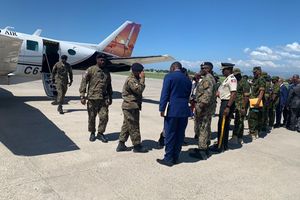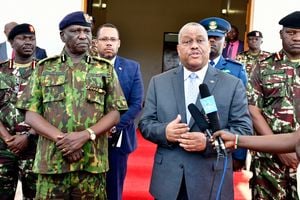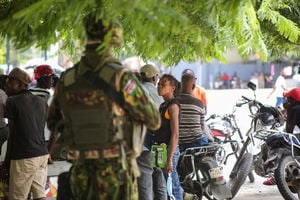
President William Ruto shakes hands with Kenyan police officers when he arrived in Port-au-Prince, Haiti.
A power struggle in Haiti following a coup attempt against interim Prime Minister Garry Conille could undermine an International policing mission led by Kenya.
The Multinational Security Support (MSS) mission commanded by Kenya’s Godfrey Otunge seeks to prop up the government in Port-au-Prince by battling armed gangs that have caused lawlessness in the Caribbean nation for years.
Over the weekend, a Presidential Transition Council formed in April 2024 to facilitate elections in two years announced the ouster of Dr Conille and named Alix Didier Fils-Aime, a businessman, as the interim Prime Minister.
However, Dr Conille, who has served for six months, insists that he is still in office arguing only an elected President can sack a Prime Minister. Haiti currently does not have a president.
“The resolution of the Presidential Transition Council, taken in defiance of the law, is clearly tainted with illegality,” Dr Conille said in a letter dismissing his attempted removal from office.
A Kenyan officer who is part of the mission told the Nation on Sunday that the uncertainty over the leadership of the war-torn nation is not good for the peacekeeping mission.

Kenyan police officers after their arrival in Port-au-Prince, Haiti June 25, 2024.
“For now things are not clear, especially on the move to unseat Dr Conille. However, before the weekends, we shall have known which route the whole matter will take,” said the officer who spoke in confidence as he is not authorised to address the media.
Mr Wethzer Piercin, a Haiti-based journalist, also said there was no confirmation yet on the change in the leadership of the country.
“There is a lot of information going around about Dr Conille, but currently nothing can be confirmed,” Mr Piercin told Nation on Sunday afternoon.
The council that announced the changes has nine members namely Leslie Voltaire (Chairman) as well as members Edgard Leblanc, Smith Augustine and Fritz Jean.
Other members are Laurent Saint-Cyr, Louis Gerald Gilles, Emmanuel Vertilaire, Regine Abraham and Frinel Joseph.
The members in a decree said they had unanimously picked the new interim Prime Minister.
“We members gathered on Friday, November 8, 2024, at the National Palace, made the choice by consensus of Citizen Alix Didier Fils-Aime as Prime Minister. This resolution will be published and enforced for legal purposes,” said the council in a statement.
But Edgard Leblanc did not sign the document and no reason has been given for that.
For some time, infighting has rocked the council which has also had differences with Dr Conille.
For instance, the council has pressed for a cabinet reshuffle but Dr Conille has refused to give in to the demands.
This has not gone down well with Mr Voltaire who heads the council.
In addition, three council members namely Smith Augustin, Emmanuel Vertilaire and Louis Gerald Gilles had in August been removed from the council after they were named in a bribery scandal.
Dr Conille, who was hosted by President Ruto in Nairobi last month, has supported the Kenya-led peacekeeping mission.
Financing
Funding for the mission whose top financier is the US government is also uncertain following the election of President Donald Trump. It is not immediately clear whether he will implement the agreement reached by his predecessor Joe Biden.
President Ruto recently indicated that Kenya was willing to transform the mission into a fully-fledged United Nations peacekeeping mission.
The UN Security Council in October extended the mandate of the Kenya-led mission by another year.
“I have had a constructive conversation with US Secretary of State Antony Blinken on the Kenya-led MSS mission in Haiti. We discussed the transition of the mission into a UN peacekeeping operation to enhance the capability of the mission to help stabilise Haiti,” President Ruto said in a statement on Thursday, November 7.
Kenya has also said an additional 600 police officers are scheduled to be deployed to the Caribbean country. Already, a 400 Kenyan police officers have been deployed.
Last Friday, Inspector General of Police Douglas Kanja closed the MSS Mission to the Republic of Haiti Course at the National Police College Embakasi ‘A’ Campus.
Also Read: Kenya to deploy female SWAT team to Haiti
The 600 officers who have been undergoing the training are drawn from the General Service Unit (GSU), Anti-Stock Theft Unit (ASTU), Rapid Deployment Unit (RDU) and the all Female Special Weapons and Tactics Team (SWATT).
Apart from Kenya, other countries that have sent their officers to Haiti are Jamaica and Bahamas.
For four years, gangs have made Haiti ungovernable since the assassination of President Jovenel Moise plunged the country into civil war.
The gangs had taken over various areas and in addition, they took control of major roads in the Caribbean-based nation.
However, since June 25, when the Kenyan troops arrived in Port Au Prince, joint operations with the Haiti National Police (HNP), have helped push back the gangs and reopen major roads that had been barricaded by the militia.
But gang attacks at Pont-Sonde recently left over 60 people dead, the deadliest attack since the arrival of the foreign troops.












